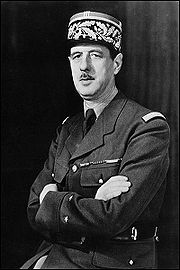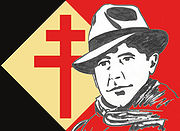- National Council of the Resistance
-
The Conseil National de la Résistance (CNR) or the National Council of the Resistance is the body that directed and coordinated the different movements of the French Resistance - the press, trade unions, and members of political parties hostile to the Vichy regime, starting from mid-1943.
Contents
Background
Various resistance movements had arisen in France since the start of the German occupation in June 1940. With the possible exception of the Francs-tireurs partisans and other groups loyal to the Communist Party of France, the maquis groups were mostly unorganised and unrelated to one another. This lack of coordination made them less effective in their actions against the Nazi occupiers.
Formation and Meeting of Resistance Fighters
Charles de Gaulle, exiled in London and recognized by the UK as leader of a French government in exile, began seeking the formation of a committee to unify the resistance movements. On January 1, 1942, he delegated this task to Jean Moulin. Moulin achieved the feat on May 27, 1943 with the first meeting of the Conseil National de la Résistance in the apartment of René Corbin on the second floor of 48, Rue du Four, in Paris.
Aside from Moulin and his two assistants, Pierre Meunier and Robert Chambeiron, participants in the first meeting included representatives of the eight main French resistance movements, members of six of France's major political parties and the two large pre-war trade unions all attended the Rue du Four meeting.
Representatives of the eight major resistance movements:
- Pierre Villon (Front National)
- Roger Coquoin (Ceux de la Libération)
- Jacques Lecompte-Boinet (Ceux de la Résistance)
- Charles Laurent (Libération-Nord)
- Pascal Copeau (Libération-Sud)
- Jacques-Henri Simon (Organisation Civile et Militaire)
- Claude Bourdet (Combat)
- Eugène Claudius-Petit (Franc-Tireur)
Under Jean Moulin's earlier influence, Combat, Franc-Tireur and Libération-Sud had already agreed to regroup themselves in January 1943 to create the Mouvements Unis de la Résistance, with their joint military arms forming the Armée secrète (Secret Army).
Representatives of the two trade unions:
- Louis Saillant (Confédération générale du travail)
- Gaston Tessier (Confédération Française des Travailleurs Chrétiens)
Representatives of the six main political parties of the French Third Republic:
- André Mercier (French Communist Party)
- André Le Troquer (Section française de l'Internationale ouvrière)
- Marc Rucart (Radical-Socialists)
- Georges Bidault (Parti démocrate populaire)
- Joseph Laniel (l'Alliance Démocratique)
- Jacques Debu-Bridel (Fédération républicaine)
Arrest of Jean Moulin
However, shortly after the CNR's creation, its president Jean Moulin was arrested at Caluire by the SS. Over the next three days, Moulin was tortured by Klaus Barbie himself, and would die during his transfer to Germany. He divulged no information to his torturers and his silence likely allowed the CNR to pursue its activities.
After Moulin's capture and death, the Conseil National de la Résistance decided for security reasons to end its plenary sessions and created an executive office of five members, with each member representing his own group and two others. The new office was under the direction of Alexandre Parodi, delegate-general, and Georges Bidault, the new president. On September 9, 1944, Louis Saillant succeeded Bidault as head of the CNR.
Program of the Conseil National de la Résistance
On March 15, 1944, the CNR adopted, after months of negotiations, the Program of the Conseil National de la Résistance.[1] The document was strongly influenced by communist groups like the Front National, especially in part II, "Measures to be taken immediately after the liberation of the territory", which envisioned the establishment of a social democracy with a planned economy in France following liberation. Some of these proposed measures were applied, at least to a certain extent, after liberation, including the nationalisation of energy (Électricité de France was founded in 1946), insurance companies (AGF in 1945) and banks (Crédit Lyonnais in 1945, Société Générale in 1946), the creation of social security programs and the independence of trade unions. They constitute a large part of the so-called acquis sociaux of the second half of the twentieth century in France.
References
- The text of this article was translated from this version of the French-language Wikipedia article "Conseil National de la Résistance".
External links
- List of members of the Conseil National de la Résistance from the archival web site of former French Prime Minister Alain Juppé,
- Description of the Conseil National de la Résistance from the Musée de la Résistance Nationale,
- Programme du Conseil National de la Résistance from Wikisource,
- France Républicaine - Conseil National de la Résistance,
- Article in the magazine l'Humanité,
- Le Programme du Conseil National de la Résistance.
Categories:- Charles de Gaulle
- French Resistance
- Military history of France
- World War II non-governmental organizations
Wikimedia Foundation. 2010.


